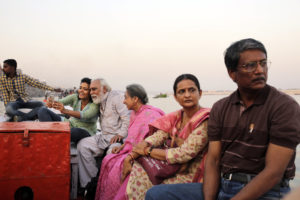 One evening at the dinner table, Dayanand Kumar (Lalit Behl) announces to his family that he has had a dream that means his time has come, and that he needs to donate a cow and travel to the holy city of Varanasi to die.
One evening at the dinner table, Dayanand Kumar (Lalit Behl) announces to his family that he has had a dream that means his time has come, and that he needs to donate a cow and travel to the holy city of Varanasi to die.
“How can he possibly know his time is up?” asks his son Rajiv’s wife. Maybe it’s just one of those things you know when the time has come. Daya believes that a persistent and recurring dream means his death is approaching, so he heads to the Hotel Salvation in Varanasi in order to, well, achieve a final salvation. “Death is a process,” announces the proprietor of the hotel, and wonders if Daya is ready to start that final journey towards his own death. The rules at the Hotel Salvation are strict, and the time that Daya is permitted to stay is limited is fifteen days; if you die, fine. If you don’t, then you return home. The assumption, then, is that people arrive there because they really are at the end of their life – though, as we discover, some of the Hotel Salvation’s residents have lived there for many years, fifteen days at a time, under a revolving door of assumed names.
The film captures the stresses and strains of the relationships between generations – particularly between parents and their own aging children, caught between what seems like the whims of elderly parents, though the reality is our parents will die, and very often, as they get older, they feel the end of their lives drawing nearer, and feel the need to tie up loose ends and make some kind of peace beforehand. Rajiv’s father may not *really* know the exact date of his death, but, like many older people, he knows it is inevitable. Middle-aged children often ignore or dismiss these thoughts, seeing them either as morbid, or, perhaps, fearing the loss of their parents and not wanting to face that fact. And the death of a parent forces the middle-aged child to face his or her own mortality, even as the pressures of life (providing for a family, making sure their own children are settled) mean they have little time to devote to tying up their own loose ends.
Oh, how I could connect with the middle-aged Rajiv (Adil Hussain): wanting to do the right thing and make sure his father is looked after, yet often tired and frustrated and, frankly, baffled at his father’s decisions and belief in his death dream. Mishra-ji who runs the hotel advises Rajiv to relax a little, but how can he do that when he needs to look after his father, and try to manage his work over the phone?
Rajiv can’t win, because the obligations he faces – towards his father, towards his family, towards his job – are not those that he can easily dismiss. As the time draws out, and his father shows no signs of shuffling off his mortal coil, Rajiv grows more stressed and more angry, frustrated, it seems, by the uncertainty of everything.
These are the moments in life that throw everything into the spotlight. Old hurts, long buried, rise to the surface and open fresh wounds. Stress takes its toll on everyone in the family; relief that Daya recovers from illness is contrasted with the fact that the fifteen days are passing, and some decision will have to be made about whether Daya stays or returns home.
The scene in which the cow is blessed by the pandit sums up perfectly the situation families everywhere find themselves in: the elderly father is focussed on the situation at hand, the pandit handles the blessing and then wants to talk to the family about the daughter’s wedding. The middle-aged son does what the pandit requires and listens to him even as he hustles to get his car out and go deal with more pressing business, urging his daughter Sunita (taking pictures of the calf) to hurry up and go with him. In the end, the elderly father is left standing alone, with the whirlwind of busy-ness suddenly moving on and leaving him behind.

The LIFF 2017 programme selections have had a knack, this year, of touching me so deeply and raising up a continuous well of tears, and Hotel Salvation is no exception, particularly as its themes are so close to things my own family have been experiencing. Frayed nerves and heartfelt emotions coupled with tender moments form the core of this brilliant film. Daya’s fifteen days turn into fifteen more, because, as long-time resident Vimla points out, it doesn’t matter what you do, or you don’t do, death will come when it wants to. You can’t die just by trying, or by dreaming it.
Time passes. Rajiv loses clients, and his anger simmers. He wonders why his father is convinced his time has come. His father tells him he’s just grown tired of the world, and tired of always having to make an effort – something I’ve actually heard from family elders. Rajiv and his father spend time talking – there are small moments of complicity and laughter, such as when Daya wonders if he should be reincarnated as a kangaroo. There are the small pleasures of food, of sharing, of conversation.
Ultimately, though, for Rajiv, this is a point in his life where he sees everything spinning out of control – this, I think, is one of the most profound things the film gets right. The Hotel Salvation is a source of liberation for its residents, but for Rajiv, it represents a kind of entrapment – everything starts going wrong: clients abandon him, his daughter decides to get a job and cancel her wedding, and his father, well, just never seems to die, and Rajiv turns between lashing out in anger, and tamping it down so that it simmers under the surface. Rajiv blames his father for spoiling his granddaughter, rather than seeing that it’s important for her to live life on her own terms. The emotions in the film are so raw, and so right, and Adil Hussain plays them to perfection, the strain showing in his body, his face, in his tired eyes.
Writer/director Shubhashish Bhutiani’s first feature film is splendid on so many levels, and incredibly life-affirming despite its morbid subject matter. Daya’s final words, written in his diary, are a testament to life and how it should be lived: follow your heart, because your heart knows the difference between truth and illusion, and the heart’s truth will break through illusion’s suffering. This, ultimately, is the key to salvation.











